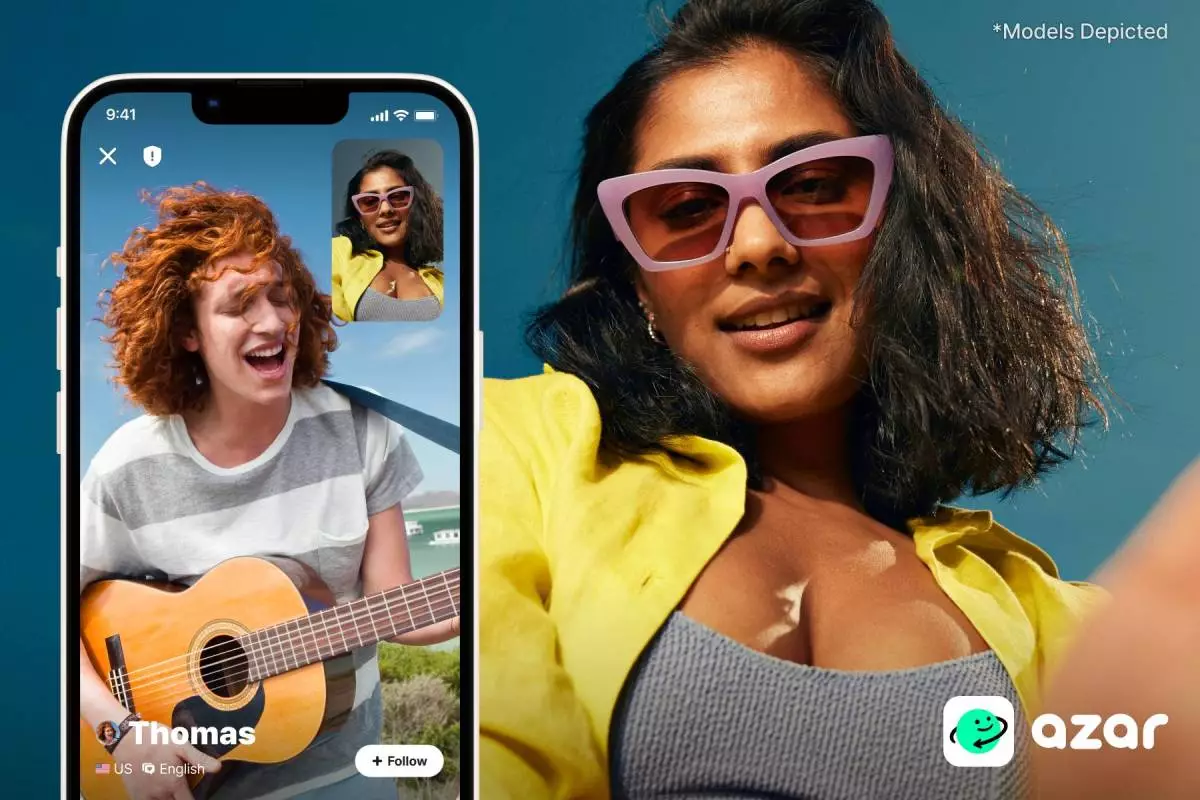Azar has made significant strides in the digital landscape, boasting over 100 billion random video chats since its inception. It connects users across the globe, yet it has only recently set its sights on the competitive U.S. market. Originating from Seoul and part of the Match Group—alongside other popular dating platforms like Tinder and OkCupid—Azar presents itself as a unique player in a field laden with challenges and opportunities.
The success of Azar lies in its distinct approach to fostering connections. Unlike other random video chat platforms like Omegle and Chatroulette, which garnered reputations for unsavory content and dangerous anonymity, Azar employs a hybrid moderation system blending both human oversight and artificial intelligence. According to CEO Linda Kim, this strategy not only prioritizes user safety but also enhances the quality of interactions within the app—a crucial factor for attracting a generation increasingly concerned about online safety.
Yet, the U.S. market poses unique challenges for Azar. For millennials reflecting on the era of Omegle and Chatroulette, the memories of random encounters are often mixed with discomfort and ridicule. The latter platforms gained notoriety for exposing users to inappropriate behavior, casting a long shadow of skepticism over random video chat applications. As a result, comprehending the nuances of these past experiences is critical for Azar as it attempts to forge a new narrative in the hearts of American users.
The cautionary tales of Omegle’s closure, attributed to a significant legal settlement concerning sex trafficking, and the negative portrayal of Chatroulette further complicate Azar’s endeavor. However, Azar’s efforts to implement advanced moderation techniques could present a refreshing change from earlier, reckless platforms. Women and young people, in particular, are often more wary of online interactions, which can feed into the apprehension surrounding apps with a similar model.
One of the key demographics that Azar aims to engage is Generation Z. This cohort, often described as the “loneliest generation,” craves authentic connections in a digital world that seems to offer plenty yet often feels isolating. To that end, Azar employs features that promote spontaneity and accessibility, allowing users to engage in real-time conversations without the constraints of traditional social media platforms.
Kim suggests that the app’s primary users are eager for genuine interactions, which opens up avenues for meaningful exchanges across geographical and linguistic barriers. The in-app translation feature further enhances communication, making it appealing to those who desire to connect with international users, even when language differences pose challenges.
Such functionality extends beyond mere utility; it fosters a sense of belonging and community that many young individuals find appealing. By creating an inviting atmosphere that transcends cultural boundaries, Azar hopes to cultivate a user base that values diversity and authentic communication.
Linda Kim, with her rich background in technology and social applications, adds a level of credibility and vision to Azar’s strategy. Having re-established herself in the realm of social apps after diversifying her career, Kim understands the importance of cultivating brand identity and trust. She often engages with the platform as a “regular user,” providing insight into user experience and fostering community engagement.
The irony of her youthful appearance receiving judgments from fellow users based on her appearance speaks volumes about the generational divide when it comes to online interactions. Kim’s journey highlights a salient truth: the need to create relatable and approachable leadership in technology, especially within fields revolving around connection, communication, and camaraderie.
As Azar aims to regain traction in the U.S. video chat market, it must deftly negotiate user anxieties surrounding the platform’s safety. The company has made safety a cornerstone of its mission. With the rising concern around online harassment and exploitation, establishing a reputation for ensuring user security is paramount.
Improvements in the moderation system serve to reassure potential users, but the challenge lies not only in enforcement mechanisms but also in changing the narrative that surrounds random video chats. Kim’s emphasis on safety—paired with Azar’s strategic offerings—may very well serve as the innovative push necessary to shift public perception.
In essence, Azar’s entry into the U.S. market is much more than a mere expansion; it is an opportunity to redefine the landscape of random video chats. By targeting a younger demographic, prioritizing safety, and promoting genuine connections, Azar has the potential to carve out a niche that resonates with users seeking meaningful interactions in an increasingly fragmented digital environment. As it continues to evolve, the company’s response to the societal preferences and safety demands of its user base will be fundamental in determining its long-term success.

